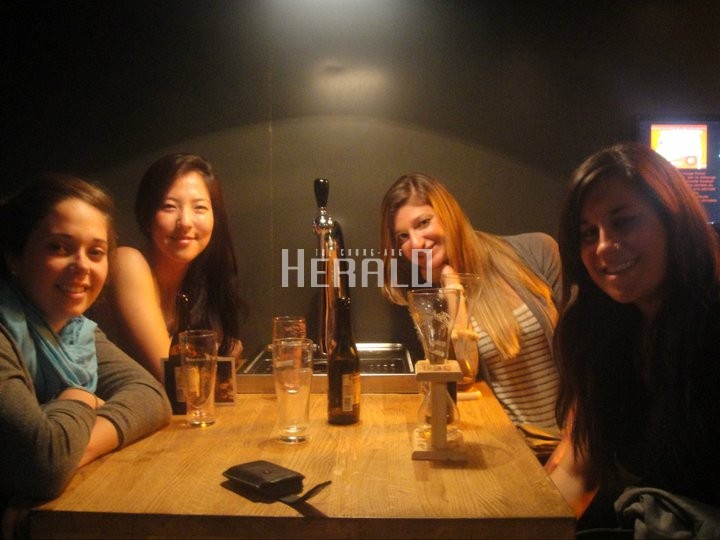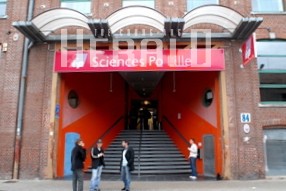
Sciences Po Lille
Sciences Po Lille, founded in 1991, is one of the nine "Institut d'études Politiques" (IEP: Institutes for Political Studies) in France, and is ranked number two in the country. Sciences Po Lille is famous for the disciplines of politics and international relations. However, classes are offered in a broad range of social sciences, so students can choose from a variety of subjects such as economics, sociology, political anthropology, French political life and more. The distribution of race is rather limited, and not many Asians can be found on campus.
Lille
Lille, located in the northern part of France, is a city full of history. Bordering Belgium, much of the architecture is more similar to that of Belgium than it is to France. Lille is famous for its Fine Arts Museum, "The Palais des Beaux Arts de Lille," the second most important museum in France after the Louvre.
How to get to Sciences Po Lille
Gare du Nord Train Station serves the northern suburbs of France, and it will take you an hour by the TGV train to get to Lille Flandre Station. In order to reach Sciences Po Lille, you will have to take a subway from Flandre and get off at Port de Valenciennes Station. It will take you about 2-3 minutes by foot to Sciences Po Lille.
Housing
As on-campus housing is not available at Sciences Po Lille, exchange students should expect to arrange their accommodations. There is a dormitory, CROUS, offered to university students who go to school in Lille, but it is not recommended that students stay there. The buildings are rather worn down and the location itself is prone to danger. For those who may be concerned about arranging their accommodation beforehand, finding an open housing dormitory near Euralille Station in Lille is recommended.
Additionally, the International Office at Lille can help exchange students arrange accommodations by providing landlords' and housing agencies' contacts. Check the host institution website for accommodation choices, cost, and application procedures. The average cost of housing in Lille in 2010-2011 was 450€ (670,774 won) per month.
Qualification & Enrollment
Students must have completed at least four semesters of undergraduate studies in order to be eligible for the Sciences Po Lille undergraduate exchange program.
Students will have to file a document both on and offline to apply for their classes. Classes are offered in both English and French, so students have a choice to choose whatever suits their comprehension level. If you are eligible to take courses in French, it is highly recommended you do so. Although both French and English classes deal with the same topic, French classes tend to provide students with a more intensive instruction.
Unlike Korea, not all classes start on the same day. So it is recommended that students keep track of their own schedules so that they do not miss their first class.
Application
Students who wish to study at Sciences Po Lille through an exchange program must contact their university's international office. The application and selection process is coordinated by the students' home universities.
In order to qualify for the international exchange program, students will have to attain a student visa. After submitting the visa application online through the CEF(Centre pour les Etudes en France), students will have to go through an interview in either English or French to qualify for their immigration. Information about visa can be found on the Ministry of Foreign Affairs' Website. It may take a while to process the visa, so be sure to plan ahead of time.
Remember to safely keep the documents you receive during the whole process in order to attain OFII (Office Français d’immigration et d’intégration), a permanent residence permission. After your arrival, Sciences Po Lille will offer you medical insurance, SMENO, which will cost 200€. In order for you to acquire CAF(Caisse d'Allocations Familiales) housing assistance, you will have to apply for SMENO.
For further information, please contact Sciences Po Lille's International Affairs Division at candidature.echange@sciences-po.fr and consult the exchange program practical information web page.
Expenses in Lille
Accommodation: 355€(529,166.55 won) +100€(149,061.00 won)(electricity)
Food: 100€(won149,061.00)(dining out fee excluded)
Culture, Leisure& Personal Expenses: 100€(149,061.00 won)(varies upon individual)
Local Transportation: 30€(44,718.30 won)(using Metro)
Monthly total: 650~700€(968,896.50won~1,043,426.00 won)
Oh Seung Yeun
Department of Sociology, Chung-Ang University
Exchange student of Sciences Po Lille from 2011 January~June
*Below is a diary entry and an interview of student Oh Seung Yeon's experience in France, more specifically on her college life as an exchange student at Sciences Po Lille.
March 4th, 2011 Sunny as usual

Dear Diary,
It's now been three months here in France, and I am surprised at how well I'm adjusting to this country. France is a very "slow" country, something that's definitely not the norm in Korea. So, frankly, I was a bit frustrated at first with the "slow" process to attain my OFII, a stamp to qualify for my stay in France, and health insurance, SMENO. All of which is a must in order to live here. It took me exactly 3 months to finally have the OFII stamped in my passport. So for the past 3 months, my travelling in this country had been illegal and I always had to go through immigration. I'm now free from it all, with the new stamp. :-)
There is hardly any discrimination here. It's a pleasant surprise to see a very broad range of culture and people coming together. I’ve talked with many French people, and they seemed curious about Korea and Asia in general. Oh, and this I recall. A few days ago when I went to a shoe store in Paris, the employee there found out I was Korean, and we started talking for about half an hour about Korean films. It was strange enough that he knew Korean directors, but to actually have their names come out of his mouth, really made me proud of Korea. It was a nice feeling. Enough for today, I had better get some sleep for tomorrow. Bonne nuit! Good night in French!
Q1. You applied for Sciences Po Lille out of many French universities. Is there a particular reason you chose Sciences Po Lille for your exchange program?
First I narrowed down my list of countries, considering the course credits at the same time. I always admired the way of life in France and its well developed social welfare systems, along with its history and culture. As a sociology major, I plan to write a graduation thesis that compares the French childcare policies with that of Korea. So I found it reasonable to learn about its policy in person. A part of me also wanted to learn French. Since there were limited choices of universities in France, I thought it would be helpful for me to study in a place that focuses on political science. Science Po Lille was the best choice, and its reputation in France made me choose it without much hesitation.
Q2. Were there special programs for exchange students like you? For example, getting aid from the faculty or specially arranged classes for the exchange students?
In the department of International Relations, a counselor was in charge of taking care of all the incoming exchange students, organizing documents, meetings, parties, housings, etc. However, him being the only person, it was impossible for all exchange students to get necessary help.
There were special French language courses for foreign exchange students, divided into different levels. There were also classes called “Seminar Overtures” which were taught only in English. Many exchange students including myself preferred taking the SO courses. However, SO classes had less variety and depth. I feel that it would be better for future exchange students to study French and take the courses taught in French.
In terms of financial aid, there is one provided to all the students studying in France called "allocation." It's also given to foreign students which help them pay for the monthly rentals for their housing. It was very helpful to me, because it provided me with almost a third of my total monthly rental fees each month.
Q3. You went on the exchange program during your first semester in 2011. Do you recommend a special time for future exchange students to pursue their study abroad?
I don’t have a particular preference, but when I went to France in December the weather was depressing and grey for most of the time. So maybe it would be better to start from first semester in France (September, 2nd semester in Korea) when the weather in France is quite nice. I personally recommend exchange students to go for a year because a semester is too short to learn in depth about its culture, way of life, and academics.
Q4. Is there something you would recommend to future CAU students preparing to go on an exchange program in Sciences Po Lille?
It is extremely important to study French before going to France. It's a must if you want to learn in depth about France and its academics. Since French people do not prefer speaking in English, your life in France will be much easier if you know the language.
It is also essential to have an open mind when visiting a different culture. If you are not ready to accept cultural differences, you will not be able to make any friends and it will be impossible to adjust to the new way of life. So I recommend students to put aside prejudices and be willing to take in new cultures. With it, I can say for sure that you will be able to enjoy every moment in France.

